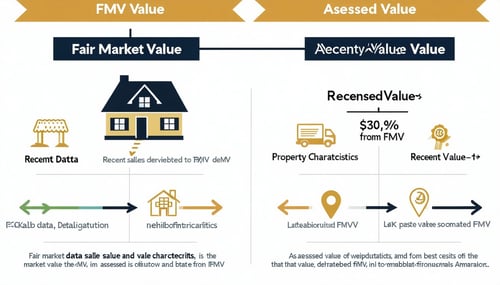Understanding the difference between Fair Market Value (FMV) and Assessed Value is essential for every DeKalb County homeowner when reviewing their Annual Notice of Assessment. These two values may seem similar, but they serve distinct purposes in calculating your property taxes — and knowing the difference could save you money if you decide to appeal.

📊 1. Fair Market Value (FMV): What the County Thinks Your Property Is Worth
Definition:
Fair Market Value is the estimated price your property would likely sell for on the open market as of January 1st of the tax year. In Georgia, counties are required to value all real property at FMV annually per state law (O.C.G.A. § 48-5-2).
How It's Determined in DeKalb:
The DeKalb County Board of Tax Assessors calculates FMV using:
-
Recent Comparable Sales in your neighborhood
-
Property Features (square footage, condition, renovations, garage, basement, pool, etc.)
-
Location & Amenities (school zone, neighborhood quality, proximity to transit/shopping)
-
Market Trends and general economic conditions
Why It Matters:
If you appeal your taxes, you're almost always challenging the FMV, not the Assessed Value. If you successfully reduce the FMV, your entire tax liability decreases accordingly.
🧮 2. Assessed Value: The Portion You Actually Pay Taxes On
Definition:
The Assessed Value is the taxable portion of your property's FMV. In Georgia, including DeKalb County, most real property is assessed at 40% of its Fair Market Value.
🧾 Formula:
Assessed Value = FMV × 40%
Legal Authority:
This ratio is set by Georgia law (O.C.G.A. § 48-5-7) and is consistent across counties for residential property.
Why It Matters:
Your exemptions (like the Homestead Exemption) apply to this Assessed Value, not the FMV.
🔁 How It All Ties Together:
Here's the step-by-step breakdown of how your property tax bill is calculated:
-
DeKalb County assesses the FMV of your home.
-
They calculate 40% of that value to get the Assessed Value.
-
Exemptions (like Basic Homestead, Senior, or Disability) are subtracted from the Assessed Value.
-
Millage Rates (tax rates set by the county, school board, city, etc.) are applied to the net taxable value.
-
The result is your annual property tax bill.
📉 Why Understanding This Helps You Save:
-
Appealing Your Taxes: You’ll be appealing the FMV, not the Assessed Value. A lower FMV → lower taxes.
-
Exemptions Impact: Since exemptions are applied to Assessed Value, knowing the 40% rule helps you estimate your actual savings.
-
Budgeting: Understanding the 40% ratio helps you better forecast future tax changes based on market trends or renovations.
📌 Example:
If DeKalb County assesses your home at a Fair Market Value of $300,000, your:
-
Assessed Value = $300,000 × 40% = $120,000
-
If you qualify for a Basic Homestead Exemption of $10,000, your net taxable value becomes $110,000.
-
That net taxable value is then multiplied by the millage rate to calculate your final tax bill.
📝 Summary
| Term | What It Means | Used For |
|---|---|---|
| Fair Market Value | What your home is worth on the market (County’s estimate) | Starting point for taxes |
| Assessed Value | 40% of FMV, as mandated by Georgia law | Used to calculate your tax bill |
| Exemptions | Reductions applied to Assessed Value | Lowers your taxable amount |
🕐 Important Reminder:
You only have 45 days from the date printed on your DeKalb County Annual Assessment Notice to file an appeal if you disagree with the valuation. Don’t miss your opportunity to dispute an incorrect assessment!
📚 Helpful Resources
-
🧾 DeKalb County Board of Tax Assessors
https://www.dekalbcountyga.gov/property-appraisal
Phone: (404) 371-0841-
File an appeal, view your property data, or review your FMV and Assessed Value.
-
-
💰 DeKalb County Tax Commissioner’s Office
https://dekalbtax.org-
Pay tax bills, apply for exemptions, view due dates.
-
-
📄 Georgia Department of Revenue – Property Tax Division
https://dor.georgia.gov/property-tax-
Learn about Georgia’s tax rules, FMV requirements, and appeal rights.
-
-
⚖️ O.C.G.A. § 48-5-7 – Assessment Ratio Law
https://law.justia.com/codes/georgia/2020/title-48/chapter-5/article-1/section-48-5-7/



